Adam Larson / Caustic Logic
June 17 2009
IN CUSTODY: A MURKY BEGINNING
In charge of security for the mostly-Shiite southern city of Basra, the British military enjoyed a generally placid command relative to, say, the Sunni triangle. Relations started worsening, however, in autumn of 2005, starting with three British soldiers killed in the first weeks of September. Several coalition arrests of prominent spiritual leaders on the 18th increased tensions, spurring protests and possibly further problems. The burden was shared, thankfully, with the Coalition’s Iraqi partners in peace and stability, like the Basra police force, who were also on guard as the morning of Monday, September 19 2005 drew up over them.
Accounts differ or are vague on almost all details about the events of that morning, starting at a time I’ve seen best narrowed down to “before dawn.” [1] The troubles began with two occupants of a well-used white car, similar to a later model Toyota Cressida. The car’s direction of travel is not clear from available sources, nor the location of this crossing-of-paths; it’s alternately been described as a police station or a police checkpoint. We do know that the two men inside sported traditional gauzy Arab shirts, short beards, curly black hair and some kind of head scarves, in an unspecified style. Of course these were disguises; they were really British Special Forces soldiers, generally reported as SAS, doing something undercover.
Accounts and reports differ on just what happened between the soldiers and the police attempting to halt them. It’s agreed by all that the men in the car fired shots at the police, but all other details remain murky. The first reports from Iraqi authorities were that at least two people had been shot, one fatally and one not. Later reports, for the most part, repeated these. Whether both were police or one civilian, and if so which was killed - variations have been reported. BBC's first is typical; the charge was "allegedly shooting dead a policeman and wounding another." [2]
About a week after the incident, “Iraqi police involved in their arrest” gave a Sydney Morning Herald reporter “detailed accounts of last Monday's events.” The article itself is a gratuitously slanted piece, taking every chance to imply that one of the thousand lurid Arab evils permeating the Basra system had to exculpate the Brits entirely (see below). Nonetheless, it cites:
Captain Ahmed al-Shimari, who was on duty last Monday, said the soldiers had been spotted taking photographs from a car. Three officers, Fadil Hadi, Allah al-Bazuni and Qutayba Sa'ami, ran towards the car. Mr Hadi fired two warning shots and the soldiers returned fire, hitting Mr Sa'ami in the leg. [3]
According to this version, that was the only injury caused by the soldiers. All reports of a death were errors – or worse – from hostile local officials. But whatever the details, somehow the two men were apprehended alive and taken to the local police station for questioning. By then it was discovered that under their terrorist-like garb the men were quite Caucasian – Chechens? One Basra official said “they refused to say what their mission was and suggested that we ask their commander.” [4] The closest they had to identification on them said the same thing – laminated cards saying "In an emergency, please call US and UK forces,” providing different phone numbers for Basra and two other cities in southern Iraq. [5]
A graphic provided by Times Online (London) indicates it wasn’t until 10:40 am – apparently with their “one phone call” – that the soldiers put in an emergency call to headquarters. [6] Soon British forces were talking with the Basra police captains and local officials; they acknowledged the two as their own, and negotiations for their release began, as a military detachment was assembled to back up their bargaining position.
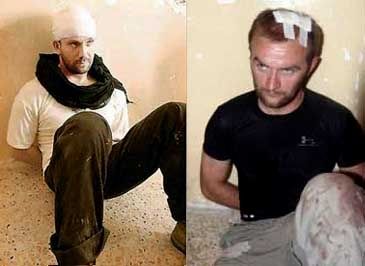
In the meantime, the two were held at the jail compound in southwest Basra, about midway between British military HQ and the Coldstream Guards HQ. In a room with yellow chipped-paint walls they sat hands-bound on an ugly “granite look” aggregate floor, as Arab news cameramen were allowed in to film them (see images above). [7] The two men were apparently beaten or injured in capture, though not badly, sporting bandaged heads. I would presume the blood staining the lighter haired guy’s pants is his own. Note the darker-haired guy has a black scarf around his neck; in later shots this is removed and he’s clearly been doused with water. Both carry an air of defiance, a thin smirk of nonchalance. I think they look pretty scared.
WEAPONS: STANDARD OR MASS DESTRUCTION?
Also on display was their confiscated tool kit, including among a car jack, various rucksacks and plastic cases, BBC’s Reporter Richard Galpin acknowledged “assault rifles, a light machine gun, an anti-tank weapon, radio gear and medical kit.” Speaking with British forces, Galpin passed on that “this is thought to be standard kit for the SAS operating in such a theatre of operations.” [8] I'm not sure if that's ridiculous or not, but it seems a bit much for what a British diplomat in Basra told the authorities was "a run-of-the mill observation mission." [9] But hey, you never know when you'll run into an Al Qaeda tank.
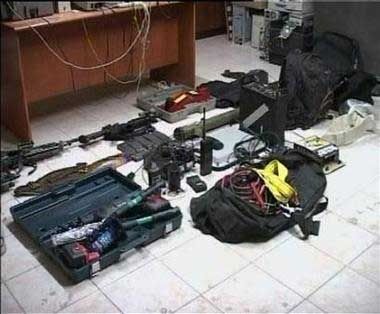
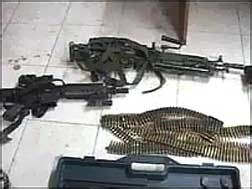


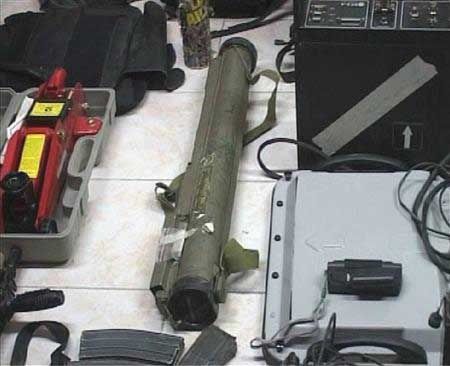 Top: whole cache as shown by basra police. Middle right: shirts and wigs the soldiers used for disguise. Rest: close-ups of weapons. Right-click, new window for larger views.
Top: whole cache as shown by basra police. Middle right: shirts and wigs the soldiers used for disguise. Rest: close-ups of weapons. Right-click, new window for larger views. There is little disagreement over the above weaponry, but the most important variable for understanding what happened that day, and what the police were thinking, is the possibility that the car was rigged with heavy explosives. Official British and friendly sources only acknowledge this has been reported. China’s Xinhua news agency reported on the 19th, citing an unnamed source at the Iraqi Interior ministry (which oversees the police), “the two soldiers were using a civilian car packed with explosives.” [10] Fattah al-Shaykh, member of the Iraqi National Assembly, told Al Jazeera as the crisis began of the “booby-trapped car laden with ammunition [that] was meant to explode in the centre of the city of Basra in the popular market.” [11]
Sheik Hassan al-Zarqani, a spokesperson for Shia leader Moqtada al-Sadr, quickly issued a press release telling the world "what our police found in their car was very disturbing — weapons, explosives and a remote control detonator […] These are the weapons of terrorists. We believe these soldiers were planning an attack on a market or other civilian targets, and thanks be to God they were stopped and countless lives were saved." Zarqani further alleged the disguise the men affected had been of Sadr’s militia, the Medhi (Mahdi) Army, and that they were to bear the blame for the planned bombing. [12] Zarqani’s release also addressed the British demands for the bombers’ release: “The police refused as they were considered to be planning terrorist attacks, and as they were disguised as members of the Mehdi Army, the police wanted to know who their target was.” [13]
Many readers will deny these sources out-of-hand, and they do seem to have an untrustworthy bias-to-information ratio. I’m not so sure what the police or courts there said about the alleged bomb, and on what evidence. There are no photos or video taken of a bomb. One photograph connected by one researcher to this story [below] shows the car cordoned off by military vehicles as if it were dangerous itself. This photo was posted by researcher Sara Meyer shortly after the events, and I can’t find another source. It was coupled with an explanation, un-sourced, how the car “was later removed by the British.” [14]
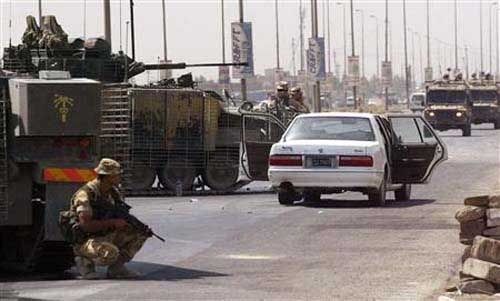
TO MAKE BAIL OR BREAK JAIL?
There was at the time little to clarify what was the intent of the SAS men – “they refused to say what their mission was” and their commanders weren’t adding much. Similar but more open disagreement surrounds the intent of the police. They claimed to be holding suspicious men engaged in violent criminal behavior, and that fits a lot of the facts. However by parading cameras by them and such, one may sense a little more enthusiasm than simply protecting public safety would explain. The British military took the view – and quite firmly – that the Basra police force was infiltrated by anti-coalition militia sympathizers. Among the charges, the Sydney Morning Herald’s article named Police Captain Yasser al-Bahadli, “a known Mahdi Army sympathizer” as the overseer of the men’s captivity. [15] Their stated belief was thus that their soldiers were in grave danger of falling into enemy hands and must be released.
This concern could of course conceal some other motive for demanding their release, but whatever the case, the Ministry of Defense explained to home audiences how a seven-person military legal team had been dispatched to the prison to try and work things out that way. [16] Preparation for a larger extra-legal military effort were also set in motion. One diplomat, Karen McLuskie, told the Guardian "we explained clearly to the authorities that they were British forces on a run-of-the mill observation mission." [17] Certainly along the way they reminded their colleagues that “under Iraqi law,” as the BBC reported, “the soldiers should have been handed over to coalition authorities.” [18] The Brits pulled strings with the national government in Baghdad and reportedly got the Interior ministry, responsible for police, to issue an order for their Basra people to release the men. It would seem that this order was ignored by the involved locals.
Probably around this time, Brigadier John Lorimer "had good reason to believe that the lives of the soldiers were at risk,” as he told the BBC, and he decided to get “near the police station to help ensure their safety by providing a cordon.” [19] By a quarter after three a small force under Lorimer’s command was at the scene, and a security cordon established around the compound. [20].
In the meantime, anger in the streets had grown, based on whatever people had heard about the soldiers at the jail. It’s difficult to say if the reportedly slain officer, or the planned bombing, or simply the attempts of the British to circumvent Basra justice, was most paramount in anyone’s mind. The Independent reported “one witness said Iraqis were driving through the streets with loudhailers demanding that the soldiers should be kept in the police station, and then jailed.” [21] But some potent combination of factors mobilized dozens – then hundreds - to the jail for a spontaneous citizen’s assembly (or militia-sponsored mob, depending which side of Operation Iraqi Freedom you’re on). The villain Captain Yasser al-Bahadli, watched as the British tanks and roiling crowd gathered ouside the station, the Herald’s article reports, and “put out word two "Israelis" had been arrested - certain death had the mob reached them.” [22]
Despite all this, the authorities behaved as if all was under control and proceeding normally - A provincial council spokesman for Basra, Nnadhim al-Jabari, announced that the two captured soldiers “were likely to go before an Iraqi court,” the Independent reported. [23] But al-Jabari didn’t have all the facts; as it turns out, the suspects would not go in front of the judge. Eventually they went home, but where exactly they went in the following hours is of great interest and some mystery.
---
Sources:
[1, 4, 7, 21, 23] McCormack, Helen. "The day that Iraqi anger exploded in the face of the British occupiers." The Independent. September 20, 2005. http://www.commondreams.org/headlines05/0920-05.htm
[2, 8, 16] BBC news. "Iraq probe into soldier incident." 20 September 2005. http://news.bbc.co.uk/2/hi/middle_east/4264614.stm
[3, 15, 22] Rayment, Sean with special sorrespondents. “Britons had visions of their throats being cut.” Sydney Morning Herald. September 26 2005. http://www.smh.com.au/news/world/britons-had-visions-of-their-throats-being-cut/2005/09/25/1127586747136.html
[5, 9, 17] Mansour, Osama and Michael Howard. "Britain refuses apology and compensation for Iraqis caught up in Basra riots." The Guardian. September 26 2005. http://www.guardian.co.uk/world/2005/sep/26/military.iraq
[6, 20] http://www.timesonline.co.uk/article/0,,7374-1790311,00.html
[10] Xinhuanet. "Iraqi police detain two British soldiers in Basra." September 19 2005. http://news.xinhuanet.com/english/2005-09/19/content_3514065.htm
[11] Chossudovsky, Michel. “British "Undercover Soldiers" Caught driving Booby Trapped Car.”
http://www.globalresearch.ca/index.php?context=va&aid=972 (Text of report by Qatari Al-Jazeera satellite TV on 19 September)
[12, 13] Keefer, Michael. "Were British Special Forces Soldiers Planting Bombs in Basra? Suspicions Strengthened by Earlier Reports." http://www.globalresearch.ca/index.php?context=va&aid=994
[14] Meyer, Sara. Basra Shadowlands. Index Research.
October 19 2005.
http://indexresearch.blogspot.com/2005/10/basra-shadowlands.html
[18, 19] BBC News. "UK soldiers 'freed from militia'" http://news.bbc.co.uk/1/hi/world/middle_east/4262336.stm


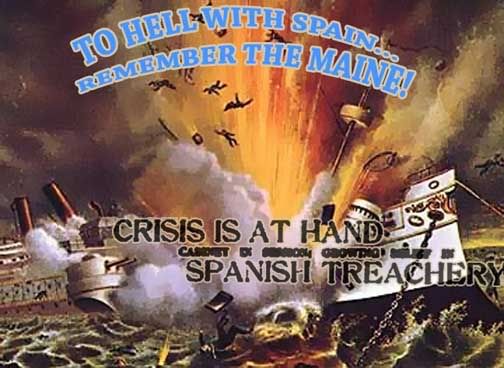
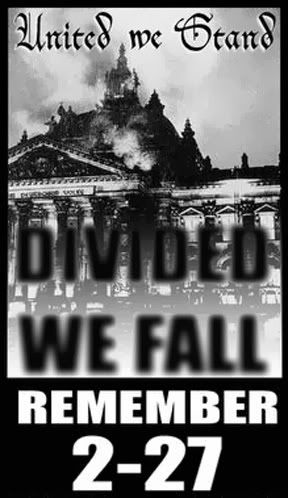


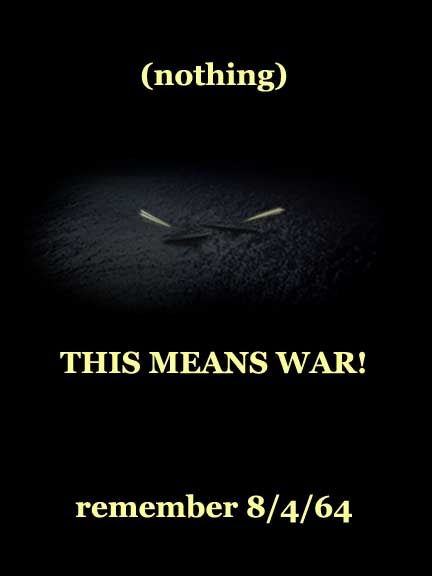


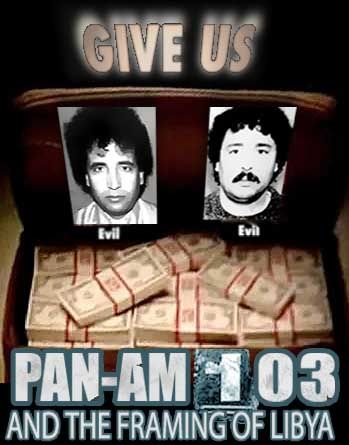



No comments:
Post a Comment